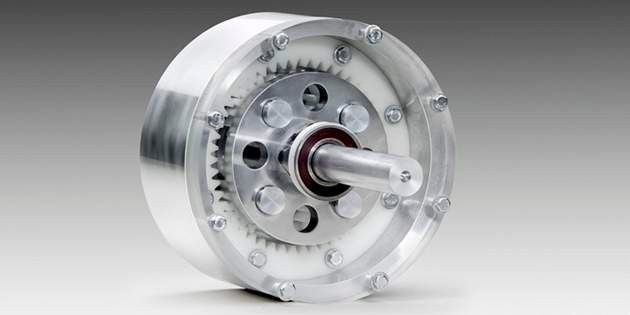Acetal Gears Demonstrate Drivetrain Performance

A Lightweight Urban Vehicle project at Bradley University shows how acetal gears — specifically gears made of Delrin® acetal resin — provide strength, toughness and low friction. The design solution needed to be strong enough to take the load-generated stress in drivetrain transmission systems. It also had to reduce noise and weight inherent in metal gears.
Replacing Metal, Reducing Weight
When Martin Morris, a professor of mechanical engineering at Bradley University, was challenged with designing and manufacturing a zero-emissions vehicle, weight was a key consideration. His Lightweight Urban Vehicle solution is a three-wheeler, licensed as a motorcycle that carries two people with baggage, and weighs 430 pounds. It offers regenerative braking, a top speed of 45 mph, and a range of 40 miles. The Bradley design team claims it costs 0.6 cents per mile to operate.
Acetal Gears Versus Metal Gears
Several acetal gears used within the vehicle’s drivetrain transmission have been intricately produced, using Delrin®. Design and manufacturing support for the project was provided by Winzeler Gear, Harwood Heights, Illinois. The gears face conditions that traditional engineers may have previously considered off limits for standard acetal material.
Mike Cassata, design engineer at Winzeler Gear, confirms, “the high-performance nature of a homopolymer acetal can manage the torque and load, while delivering low friction and reduced noise.” He added that the planetary transmission gears of Delrin® POM polyoxymethylene acetal must withstand the torque produced by a 25-horsepower motor at 6,000 rpm.
Developing New Uses for POM
The successful use of Delrin® for gears in the Lightweight Urban Vehicle helps challenge the traditional preconception that POM is unable to withstand the harsh conditions associated with transmission applications. It is not difficult to imagine further exploration into such gears being used in small engine transmissions, such as those found in riding lawn mowers and golf carts. Indeed, this will be the focus of the next generation of student design, where the young designers will be challenged to take even more weight and noise from the vehicle by using more Delrin® in the gears and housings.
“As the world changes, we need to challenge many of our preconceived notions. We also need more whole-brain, especially right-brain thinking, to innovate,” concluded John Winzeler, president of Winzeler Gears, and a fervent supporter of student challenges and art programs. “Student design challenges, such as the one initiated by Martin Morris at Bradley University, are great ways to challenge our prejudices and stimulate new ideas.”
Cost Savings Come Standard With Delrin®
Acetal gears offer the cost, consistency and supply advantages versus metal or other plastics. They can be machined from Delrin® POM bar or plate stock, significantly cutting cost and time, while delivering mechanical properties comparable to injection-molded gears. “We can proceed from design to machined models in weeks, with a small tooling investment,” said Cassata.
